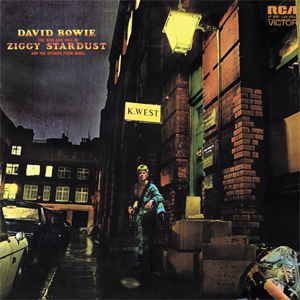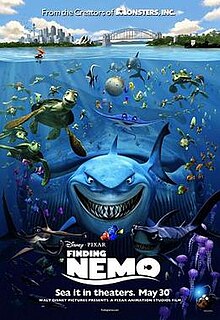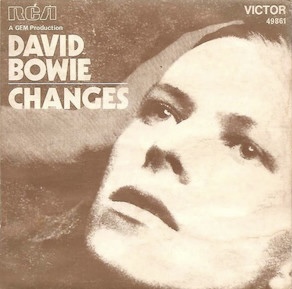
The Rise and Fall of Ziggy Stardust and the Spiders from Mars is the fifth studio album by English musician David Bowie, released on 16 June 1972 in the UK by RCA Records. It was co-produced by Bowie and Ken Scott and features Bowie's backing band the Spiders from Mars, comprising Mick Ronson, Trevor Bolder and Mick Woodmansey. Most of the songs were written around the same time as Bowie's previous album Hunky Dory (1971). After that album was completed, recording for Ziggy Stardust commenced in November 1971 at Trident Studios in London, with further sessions in early February 1972.

Finding Nemo is a 2003 American computer-animated adventure film produced by Pixar Animation Studios and released by Walt Disney Pictures. Directed and co-written by Andrew Stanton with co-direction by Lee Unkrich, the screenplay was written by Bob Peterson, David Reynolds, and Stanton from a story by Stanton. The film stars the voices of Albert Brooks, Ellen DeGeneres, Alexander Gould, and Willem Dafoe. It tells the story of an overprotective clownfish named Marlin who, along with a regal blue tang named Dory, searches for his missing son Nemo. Along the way, Marlin learns to take risks and comes to terms with Nemo taking care of himself.
Kook or KOOK may refer to:

Hunky Dory is the fourth studio album by English musician David Bowie, released on 17 December 1971 by RCA Records. Following the release of his 1970 album, The Man Who Sold the World, Bowie took time off from recording and touring. He settled down to write new songs, composing on piano rather than guitar as on earlier tracks. Following a tour of the United States, Bowie assembled a new backing band consisting of guitarist Mick Ronson, bassist Trevor Bolder and drummer Mick Woodmansey, and began to record a new album in mid-1971 at Trident Studios in London. Future Yes member Rick Wakeman contributed on piano. Bowie co-produced the album with Ken Scott, who had engineered Bowie's previous two records.
Marc Evans is a British director of film and television, whose credits include the films House of America, Resurrection Man and My Little Eye.

"Life on Mars?" is a song by English singer-songwriter David Bowie, first released on his 1971 album Hunky Dory. In 1968, Bowie was commissioned to write English lyrics for the Claude François French song "Comme d'habitude". After his lyrics were rejected, songwriter Paul Anka rewrote it into "My Way", which became famous by singer Frank Sinatra in 1969. Annoyed at the success of "My Way", Bowie used the song as a template and wrote "Life on Mars?" as a parody of Sinatra's recording. Like other songs Bowie wrote during this period, it was written primarily on piano. Recording for "Life on Mars?" took place on 6 August 1971, the final day of the Hunky Dory sessions. Co-produced by Bowie and Ken Scott, the backing band consisted of guitarist Mick Ronson, bassist Trevor Bolder and drummer Mick Woodmansey; Ronson also composed the song's string arrangement. After failing to acquire pianist Dudley Moore, piano was played by Strawbs member Rick Wakeman.

"Changes" is a song by English singer-songwriter David Bowie, originally released on his 1971 album Hunky Dory. RCA Records then released it as a single from the album on 7 January 1972. Written following his promotional tour of America in early 1971, "Changes" was recorded at Trident Studios in London between June and July that year. Co-produced by Bowie and Ken Scott, it featured Strawbs member Rick Wakeman on piano and the musicians who would later become known as the Spiders from Mars: guitarist Mick Ronson, bassist Trevor Bolder and drummer Mick Woodmansey. The song also marks the first instance of Bowie playing the saxophone on one of his recordings.
"Oh! You Pretty Things" is a song written by English singer-songwriter David Bowie, released on his 1971 album Hunky Dory. It was the first song he wrote for the album. Bowie recorded the song as a demo before giving it to singer Peter Noone, lead singer of Herman's Hermits, who decided to release it as his debut solo single. Featuring Bowie on piano, Noone's recording was produced by Mickie Most and featured structural and lyrical differences from Bowie's later version. Released by RAK Records in April 1971 under the title "Oh! You Pretty Thing", the single peaked at number 12 in the UK, becoming Bowie's biggest success as a songwriter since his own single "Space Oddity" two years earlier.
"Kooks" is a song written by English singer-songwriter David Bowie, which appears on his 1971 album Hunky Dory. Bowie wrote this song to his newborn son Duncan Jones. The song was a pastiche of early 1970s Neil Young because Bowie was listening to a Neil Young record at home on 30 May 1971 when he got the news of the arrival of his son.
"Quicksand" is a song written by English singer-songwriter David Bowie and released on his 1971 album Hunky Dory.
"Song for Bob Dylan" is a song written by English singer-songwriter David Bowie for his 1971 album Hunky Dory. The song references Bob Dylan's 1962 homage to Woody Guthrie, "Song to Woody". Yet while Dylan opens with "Hey, hey, Woody Guthrie, I wrote you a song," Bowie addresses Dylan by his birth name saying, "Now, hear this, Robert Zimmerman, I wrote a song for you."

"Queen Bitch" is a song by English singer-songwriter David Bowie. It was originally released on his 1971 album Hunky Dory before appearing as the B-side of the single "Rebel Rebel" in the United Kingdom in early 1974. The song was inspired by the rock band the Velvet Underground, specifically their lead singer Lou Reed. It was debuted on BBC radio in June 1971 before being properly recorded at Trident Studios in London between late June and mid-July. Co-produced by Bowie and Ken Scott, the lineup consisted of the musicians who would later become known as the Spiders from Mars: guitarist Mick Ronson, bassist Trevor Bolder and drummer Mick Woodmansey; although he appeared on other Hunky Dory tracks, Rick Wakeman did not contribute to the recording.
"The Bewlay Brothers" is a song written by English singer-songwriter David Bowie in 1971 for the album Hunky Dory. One of the last tracks to be written and recorded for the LP, the ballad has been described as "probably Bowie's densest and most impenetrable song".
"Bombers" is a song written by English singer-songwriter David Bowie. It was recorded in July 1971 and intended for the album Hunky Dory, but was replaced at the last minute by the cover "Fill Your Heart".
Life on Mars refers to the scientific investigation on the possibility of microbial life on the planet Mars.
"Song to Woody" was written by American singer-songwriter Bob Dylan and released on his debut album, Bob Dylan, in 1962. The song conveys Dylan's appreciation of American folk legend Woody Guthrie. The song is one of two original compositions featured on Dylan's debut album. Dylan also rehearsed a more country version of the song and also Mama, You Been on My Mind during sessions for Self Portrait on May 1, 1970, as heard on the 2021 compilation '1970'.
"Andy Warhol" is a song written by English singer-songwriter David Bowie in 1971 for the album Hunky Dory. It is an acoustic song about one of Bowie's early artist inspirations, the American pop artist Andy Warhol.

Aneurin Barnard is a Welsh actor. He is known for playing Davey in Hunky Dory, Claude in The Truth About Emanuel, Bobby Willis in Cilla, Tim in Thirteen, King Richard III in The White Queen, William in Dead in a Week, Gibson in Dunkirk, and Boris Pavlikovsky in The Goldfinch.

Hunky Dory is a British independent musical film about the trials of an idealistic drama teacher as she tries to put on the end-of-year show. It was written by Laurence Coriat and directed by Welsh director Marc Evans and stars Minnie Driver, Aneurin Barnard, Kimberley Nixon and Robert Pugh. It premièred at the 55th BFI London Film Festival on 25 October 2011, and was officially released on 2 March 2012 in the UK.
Fill Your Heart may refer to:







